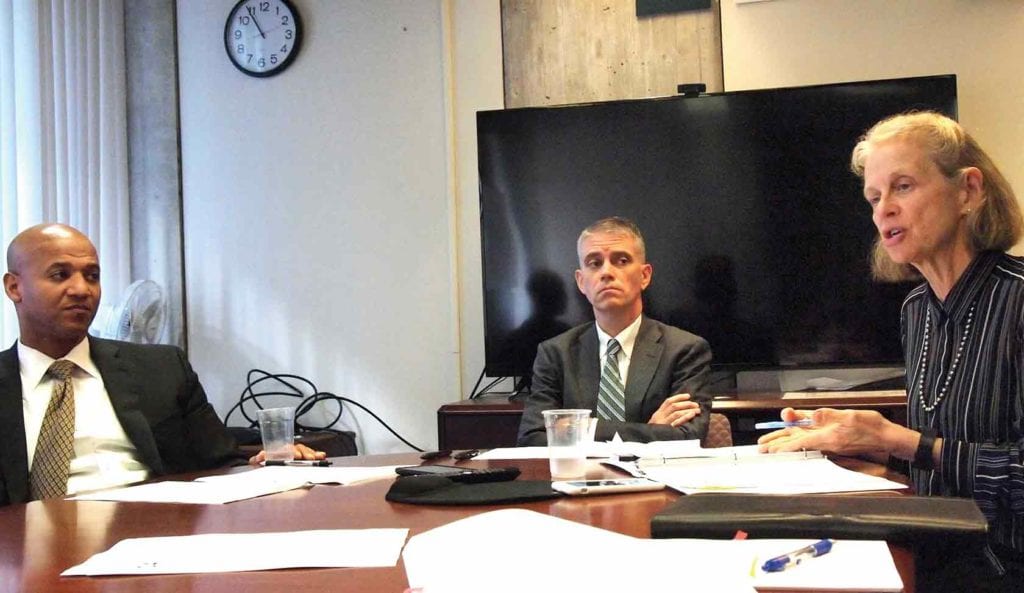New goals for city-owned land
City requires minority participation at every level of development

Developers wishing to build on city-owned land will now be required to outline the steps they will take to ensure people of color and women obtain jobs, contracts and an equity stake in the projects they intend to build, under new guidelines released last week by the Boston Planning and Development Agency.
The new guidelines, based on those drafted for parcels of land being put out to bid in Dudley Square, will also require developers to outline plans to mitigate displacement caused by new development.
“The inclusion language is pretty comprehensive,” said the city’s Chief of Economic Development John Barros in a meeting with reporters Friday. “Everything from diversity in construction, design, development, finance, operation and ownership.”
Barros and other city officials said the new language grew out of a contentious series of meetings with community members engaged in the city’s PLAN Dudley Square process, during which neighborhood residents called for greater participation of black, Latino and Asian workers in construction projects on city-owned land.
Under the new guidelines, developers will be asked to submit a “Diversity and Inclusion Plan” that details their plans to involve minority- and women-owned businesses at every step of the construction process, including the involvement of professionals such as lawyers, accountants, architects, financiers and others in addition to minority-owned building and construction firms.
Developers’ proposals will be scored based on their plans. City officials will not score proposals from developers who don’t include plans for people of color to have an equity stake, noted Department of Neighborhood Development Director Sheila Dillon.
“Folks who don’t give us in their submittals actual plans of how they’re going to do this don’t meet minimum threshold criteria, which is really a big deal for us,” she said. “We’re taking this very seriously.”
The guidelines have already been applied to Parcel 12 in Chinatown, on which 288 Tremont Street Partners LLC plans to build 171 units of affordable housing. The LLC is a collaborative entity of the Asian Community Development Corporation, Corcoran Jennison Companies, Inc., Millennium Boston, and Tufts Shared Services, Inc.
The guidelines were also baked into the requests for proposals for four parcels in Dudley Square: 135 Dudley Street, the site of the former Area B-2 Boston Police Department opposite Dudley Station; 40-50 Warren Street, which is currently a surface parking lot at the corner of Warren and Ziegler Streets; the Blair Lot on Washington Street opposite Ruggles Street; and the parking lot next to Haley House at 2147-2163 Washington Street.
Housing affordability
In addition to more stringent minority participation requirements, tthe Dudley Square parcels call for development of housing that is one-third affordable for individuals or families earning up to 50 percent of area median income, one-third affordable to families earning up to 80 percent of the area median income and one-third market rate.
Barros said the city will look for a similar commitment to affordability in proposals for other city-owned land.
“The intention is clear: Affordability matters,” he said. “It matters in a mixed-income way, and that’s where the city is heading.”
Dillon noted that 70 percent of housing built on Department of Neighborhood Development parcels in the last four years has been affordable.
“We want to know on these parcels how your development is going to help with this displacement issue,” she said. “We want an intentional plan. We’re not prescribing it, but we want the developers to say our development long-term is going to benefit this community.”
Remaining city-owned parcels available for development include R1 in Chinatown; land on Rutherford Avenue in Charlestown; the Charlestown Navy Yard; and the Raymond L. Flynn Marine Industrial Park on the South Boston waterfront.
BPDA Director Brian Golden said the city will also apply stricter minority participation requirements to the redevelopment of public facilities such as libraries and public housing projects.
Private development
In the private market, city officials have little leverage to encourage affordability, save the requirement of 13 percent affordability on projects with more than nine units, Dillon said. But private development still is key to lowering overall housing costs by increasing supply, she added.
“There is some concern that if we improve an area, the rents will rise, but we have to,” she said. “It’s hard to dispute that our housing problem is a housing shortage problem. We have to build housing in Boston and the region.”







